![Get to Know Jody]()
by NAMI Ohio | Oct 29, 2020 | Blog
Mr. Rogers would have liked Jody Demo-Hodgins because she’s a helper.
Rogers, the long-time television host of Mister Rogers Neighborhood, frequently told kids, “Look for the helpers. You can always find people who are helping.”
That description perfectly fits Jody, Director of the Children’s Division for the National Alliance on Mental Illness Ohio. A social worker by profession, she previously was with the Crawford-Marion Board of Alcohol, Drug Addiction, and Mental Health Services, including 19 years as executive director.
“I believe empathy is one of the most important things that we need to have,” Jody said. “We still have so much stigma about mental illness. There is so much hurt in the world that we can do something about.”
“We need to better educate people and have discussions so we can make mental health care part of overall health care,” Jody said. “Our brain is part of our body.”
Bev Young, the now-retired former director of the Marion Area Counseling Center, worked with Jody for many years as a non-profit community mental health services agency. “What I admire the most about Jody is she is genuinely so compassionate about providing services and meeting the needs of people with severe and persistent mental illness,” Bev said. “She was so honest and helpful in brainstorming new approaches, and being creative and innovative in trying to provide services in our area.”
Jody was born in Malone in upstate New York just about 10 miles from Canada. Her mother, Hilda, was a nurse, and her father, Ed, was a trainer and driver of harness-race horses. Her father’s occupation resulted in many moves as he followed the racetrack circuit. As a result, Jody didn’t finish the year in the same school where she started until she was a freshman at Trinity College in Burlington, VT.
She met her future husband, Jim, when both were working at a horse track. They married moved to Marion, Ohio, in 1979, and have lived there ever since. They have two children, both of whom are in the mental health field.
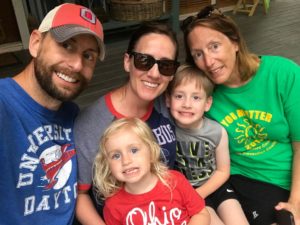
Jody said she once aspired to be a special education teacher, but eventually decided that working with people who had mental health and substance abuse issues was her calling. Those touched her personal life since her mother struggled with alcoholism and her sister had mental health problems and took her own life.
After starting her career with what is now Job and Family Services, Jody worked in a program counseling young mothers before taking a job in 1989 as associate director of the Crawford-Marion Board of Alcohol, Drug Addiction, and Mental Health Services. She became executive director in 1997, a position she held until her retirement in 2016.
Since joining NAMI Ohio, Jody has directed a wide variety of programs focusing on providing mental health services for children and support for their parents.
She said mental health services in Ohio have improved but the state “never fulfilled its promise” about what it intended to do once state psychiatric hospital closed. The waves of substance abuse problems, including overdose deaths, required agencies to focus time and scarce resources there. “It took our eyes off mental health needs, Jody said, ‘but the good thing is we’ve had a lot more discussion about addiction and underlying mental health issues.”
Information about NAMI Ohio and programs for children are available online at https://namiohio.org/programs/
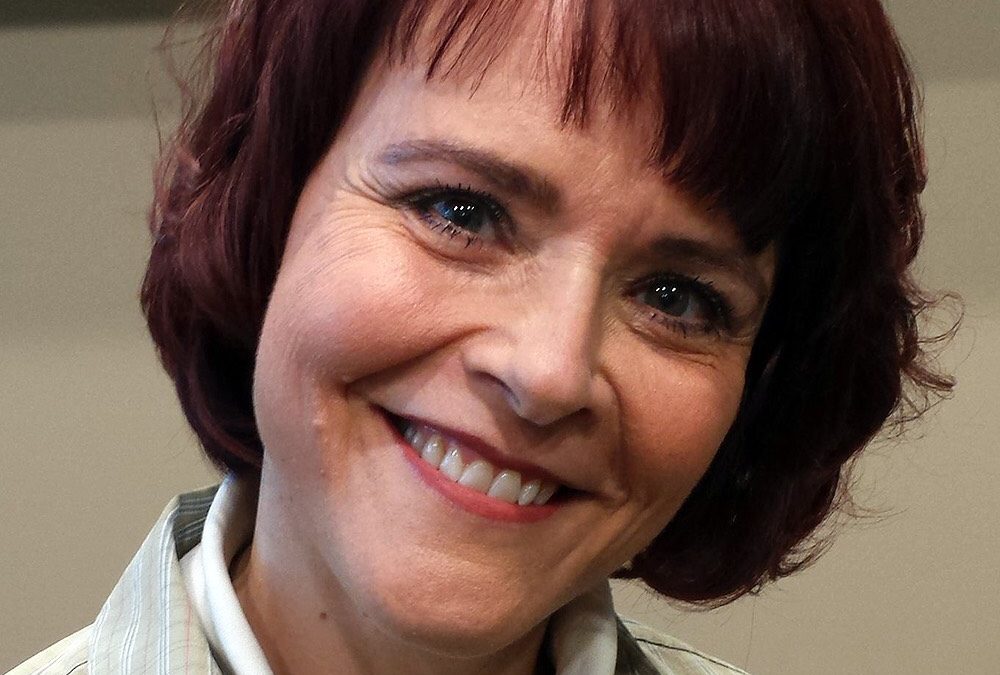
by NAMI Ohio | Oct 26, 2020 | Blog
A mental health epidemic is the crisis underlying the COVID-19 epidemic. About one-third of Americans are experiencing depression and anxiety and deaths by suicide are rising.
The bad news is the dual epidemics are not expected to go away in the near future. We are all wrestling with depression or mental illness in some form or fashion. If not ourselves, we are seeing it in the lives of our children.
But we can change the narrative. People who wrestle with their mental health need to be destigmatized. They are not weak. They are mental health warriors.
Through the NAMI Peer-to-Peer class, I learned that living through my psychotic break, I had lived through a traumatic event. Immediately after my psychotic break, I did not want to believe that I had a mental illness. I kept asking my psychiatrist to reduce my dosage, but then I couldn’t sleep. Getting a mental illness diagnosis feels like a death sentence. In a way it is. Your old self has died. My psychologist explained to me that having a psychotic break is like having a psychological house with a cracked foundation. Not only that, there’s a pit underneath your house. So, when the foundation breaks, your entire psychological house falls down into the pit and breaks into a thousand pieces.
I threw out everything I believed and started over from scratch. I had to walk through each of the stages of the grief process — denial, anger, bargaining, depression and acceptance — until I accepted the new me with a mental health diagnosis.
The reality with COVID is that we all are living through a traumatic event. The first step in the process is to walk through the grief process. COVID has changed our lives forever. From this day forward we all need to be conscious of our mental health.
Managing my mental illness means managing all the areas of my life: my sleep, medication, diet, exercise, actions, thoughts, etc. When thinking about managing all these areas, a Rubik’s cube comes to mind. Like matching up the reds, yellows, blues, etc., I must make sure my diet, exercise, medications, sleep cycle are all lined up. Managing a mental illness takes a lot of trial and error in every aspect of my life. How do I manage it? Through my daily regimen.
If you are wrestling with loneliness, depression, or suicidal thoughts due to your life circumstances or COVID, please know that you are not alone. Reach out for help. Together we can do this. I am living proof that there is life after a mental illness diagnosis.
Everyone feels like they are fighting for their lives. We have all become mental health warriors!
Danei Edelen is president for the NAMI Brown County Ohio affiliate. For information on NAMI Brown County Ohio, call 937-378-3504 ext. 102, or email bcnami@bcmhas.org.
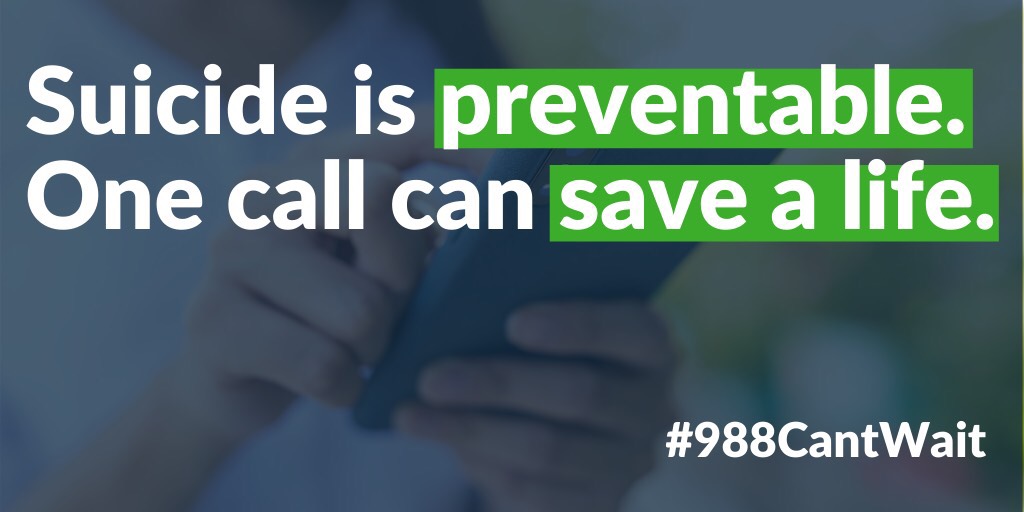
by NAMI Ohio | Oct 26, 2020 | News & Updates
A new three-digit number – 988 – to call when people are experiencing mental health emergencies has been signed into law by President Trump.
The 988 number IS NOT expected to be operational until July 2022. It will join 911, the well-known, nationally used number for health, police and fire emergencies.
The Federal Communications Commission previously selected and approved 988 and Congress passed a bipartisan bill which was signed by President Trump this week.
Mental health advocates say having a simple three-digit number will be a step forward for Americans in need to crisis care.
“The implementation of 988 is going to be an enormous boost to those who are struggling with suicidal thoughts and ideations and finding help,” said Tony Coder, executive director of the Ohio Suicide Prevention Foundation, which is part of the National Alliance on Mental Illness Ohio. “According to some reports that I have seen, national experts predict that there could be a 25 percent increase in calls to the National Lifeline once it is implemented, so there is a lot of work to do to make sure that Ohio is ready when this launces in 2022.”
The current National Suicide Prevention Lifeline is a 10-digit number — 1-800-273-TALK. However, advocates say the full number isn’t easy to remember in a time of crisis.
The new law not only establishes the new number, but includes funding and resources to help local crisis centers to handle emergency mental health emergency calls.
Officials said calls to the National Suicide Prevention Lifetime have increased as much as 6 percent during the COVID-19 pandemic.
The Ohio Suicide Prevention Foundation can be reached at 614 429-1528.
![Get to Know Jody]()
by NAMI Ohio | Oct 20, 2020 | Blog
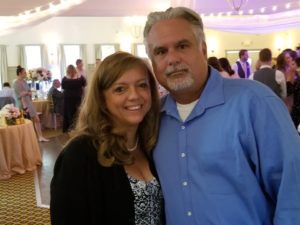
The first time she left home, Angela Patterson Lariviere had nothing but a small suitcase, a baby doll, and 25 cents for the bus. She was 12.
A quarter wasn’t enough to get her to her destination, Westland Mall in Columbus, so Angela sat quietly on the bus until the driver, feeling sorry for his lonely little rider, gave her a bus pass to finish the trip.
Fleeing from problems at home, Angela ended up with relatives that night, one of dozens of times she bounced around from place to place on a life’s journey that led to her role today as a wife, mother to four, and over the years caregiver to another 23 children, and now YouthMOVE director for the National Alliance on Mental Illness Ohio. YouthMove is a statewide youth-led organization devoted to improving services and systems to support youth inclusion, mental wellness, positive supports and healthy transition and support out of foster care.
Angela, at 48, has lived more places, experienced more trauma, and learned more lessons than most people do in a lifetime. Through it all, she remains remarkably resilient with boundless energy to keep fighting for children, her own and hundreds of others. Angela credits her mother with giving her a strong foundation in faith to her through the hard times.
“I am passionate about the work I do because I’ve been there but I don’t pretend to know someone else’s journey,” Angela said.” I support youth because I know they are all strong and resilient even if they don’t believe it. I teach them to advocate for themselves, become leaders, and work together to improve and strengthen communities.”
Erin Cordle, associate director of the Office for Social Concerns for the Roman Catholic Diocese of Columbus, calls Angela “One of the most amazing young women I’ve ever known…Angela thinks outside the box. I’m not sure she even sees the box.”
Cordle added, “The genius of her life is that she’s taken her life experiences, which have been vast and at times horrific, and used them to understand kids today to help turn their circumstances into a brighter future.”
In 2002, Angela became the first Ohioan to receive the Cardinal Bernardin New Leadership Award, named after the former Chicago archbishop, which recognizes someone who has shown leadership in dealing with poverty, in her case homeless youth.
Many of the lessons Angela shares with youth come from her own troubled upbringing which including periods of homelessness, dozens of moves, and dealing with a step-father who at times forced his children to help package drugs he subsequently sold. Her mother had a life-strong struggle with mental health issues.
“We were super-poor but we were stable for the first few years,” she said. “We had a good education, and went to school every day and to church on Sunday. She was a great, great mom and took great care of us until she became too ill.”
Angela was frequently called upon to take care of her younger sister and brother. She took them to the doctor, did the grocery shopping, stood in line for food stamps, and lied about her age so she could work at Wendy’s when she was 13.
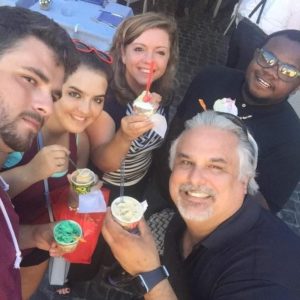
She met her future husband, Charlies Lariviere, when she was 16 and it was “100 percent love at first sight.” They married four years later.
Angela managed to graduate from Columbus East High School and studied two years at Otterbein College after winning scholarships.
She first worked for AmeriCorps and later worked for The Coalition on Homelessness and Housing in Ohio where she created the Youth Empowerment Program, a statewide council of homeless young people. She also worked with then-Senator Mike DeWine on programs for homeless youth, and with Bill Faith, head of the Coalition for Homelessness and Housing in Ohio.
“She was always very committed to that cause,” Faith said. “She was very hands-on and did a lot of good work.” He said homeless youth are “a kind of forgotten population” who receive little attention and help because they are often on their own and no longer part of a family.
Angela joined NAMI Ohio in 2017 where she continues to use her experience and energy to help young people achieve their goals. “I feel like everybody should get a shot at having opportunities to be successful and be happy. I’ve been an advocate for people my entire life.”
For information on YouthMOVE, call NAMI Ohio at 614 224-2700 or go online to https://youthmoveohio.com/
![Get to Know Jody]()
by NAMI Ohio | Oct 6, 2020 | Blog
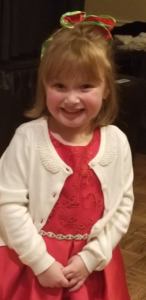
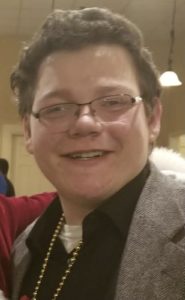
Duane Thompson was at his wit’s end with his daughter, whose chronic behavioral health problems culminated when she came at him with a knife.
“It makes you feel angry at times,” the Cincinnati father said. “Sometimes I go to work and sit there and tear up. And say “Why?”
Diane Thompson of East Liverpool, OH., was running out of options in taking care of her two grandchildren, including Leon, 18, who suffered a tumor on his optic nerve that cost him the sight in one eye.
“I was treading water” she said. “The government and Social Security won’t tell you about benefits and how to work with the system. If you don’t know how to do it, nobody tells you how.”
Sharon M. was having trouble getting Cincinnati school personnel to understand how her 11-year-old son’s attention deficit disorder and speech impediment were hampering his education.
“I realized I needed someone who knew the laws. Since I’ve been speaking about the laws, there’s a different respect at the table.”
These three different parent dilemmas have a common denominator – all have been helped by the Parent Advocacy Connection Program (PAC) operated by the National Alliance on Mental Illness Ohio. As part of the program, parents who have lived experience provide training and support to assist families involved in the child-serving systems of care in Ohio. PAC advocates use their experience with their own children to support families with what they need to help their children get services and support so that they can grow and thrive into adulthood. In addition to aiding parents in connecting their children to services, they guide them so they can move forward to advocate for themselves. Having a PAC advocate at the table with a family can help create a cultural shift as families are humanized and seen as capable and able to be there for their children. PAC advocates problem solve, collaborate and support. Most importantly, they listen, guide and support so that families they serve can become meaningful decision makers in their child’s life.
Duane Thompson and his wife, Flametta, have been dealing with their daughter Rodnetta’s issues since she was diagnosed as a child with autism spectrum and cognitive issues, bi-polar disorder, and aggressive behavior. “It’s a constant thing,” he said. Her aggressive behavior comes and goes, but occasionally she must be restrained, Duane said, relating when his daughter threatened him with a knife. It scared him and made him sad at the same time.
The light at the end of the tunnel showed when Duane’s brother referred him to NAMI Ohio. “We were having such a hard time getting her services, but my parent advocate helped me with connections,” he said. “If I have a question or I’m not real comfortable, she would help me with advice. She is the reason my daughter is getting help.”
With the help of a local agency, Duane’s daughter is how receiving medication, counseling, help with social skills, and may soon move into her own apartment.
“Meeting after meeting, NAMI was there,” Duane said. “They let you know the things you should know. I won’t have a meeting about my daughter without them.”
Diane Goodwin, at 52, finds herself in the position of many grandparents these days in raising her two grandchildren, Leon Daughtery II, 18, and Laila Powell, 6. They lives in Columbia County, a part of Ohio where there are limited services for people with health and mental health issues.
Diane began taking care of Leon and Laila because of the drug addiction of their mother, who has since passed away. “I want my kids to stay within the family,” she said.
“I want to know in my heart that they are safe and grow up right. I had to step up to the plate.”
But the job was much harder, and far more costly, than Diane anticipated, especially when Leon developed a tumor on his optic nerve that eventually cost him the sight of one eye and tunnel vision in the other. At one point, his condition was so serious he was given four months to live.
But Diane’s NAMI parent advocate helped her navigate the Social Security disability system and other programs to get Leon the help he needed, including multiple surgeries. Now, he’s hopeful of going to college to study engineering at West Virginia University.
Diane has used her new-found knowledge of help systems to get Chromebook computers for Laila’s school, she said proudly. “The word is out there, but nobody knows about it.”
“NAMI was great,” she said. “I wish people could see it first-hand.”
Sharon’s son has autistism and has struggled academically, especially with the advent of home learning that came with the COVID-19 pandemic. While he had an Individualized Education Program and a classroom attendant in Cincinnati Public Schools, that fell by the wayside when the pandemic forced schools to close. She has been working hard to make sure her son has what he needs to be successful in the academic setting.
Sharon met with NAMI and school personnel to work out special programming for him. “Parent advocates are very important,” she said. “Having an advocate who knows the laws and the changes makes them take you seriously. You are a parent who is aware.” Sharon said she was painfully aware that African-American males face additional pressures and problems in school. “At the end of the day, I realized I needed someone who knew the laws. Now there’s a different respect at the table” when she meets with educators.
“If you don’t know the law,” Sharon said, “you don’t win for your child. My child’s future is important. NAMI is definitely needed who those who value their child’s future.”
NAMI Ohio has about 40 parent advocates around the state, but is seeking more to meet the needs of parents and children. For those interested, and who have experience in the child-caring system, NAMI will provide free training and access to all necessary materials. PAC parents receive a financial stipend for their work with individual families. Additional compensation is offered to those who wish to advance to be regional PAC coordinators.
For more information on PAC, email Dana Berryman at dana@nami.org, Jody Demo-Hodgins at jody@nami.org, or call NAMI Ohio at 614 224-2700.







